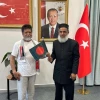Fisheries and Livestock Affairs Adviser Farida Akhter on Friday called for the inclusion of eggs in the government’s school feeding program, stressing its importance in tackling child malnutrition.
Speaking as the chief guest at a discussion marking World Egg Day, organized by the Department of Livestock Services, the Poultry Industries Central Council, and the World’s Poultry Science Association (Bangladesh branch) at the Krishibid Institution Bangladesh (KIB), she said many underprivileged children are deprived of essential nutrients.
Milk is already included in the school feeding scheme, but eggs should be added as well,” she said. “If eggs are included, it will play a vital role in combating malnutrition among students.”
Farida described the egg as an affordable, protein-rich food accessible to people from all walks of life.
Not everyone can afford beef, but eggs remain within everyone’s reach,” she said.
Highlighting the contribution of rural women and smallholders to egg production, she said, “Around 80 percent of eggs in Bangladesh come from marginal farmers. Rural women raising a few chickens not only support their families but also contribute to local nutrition.”
The adviser also expressed concern over the negative impact of excessive pesticide use in agriculture, saying it threatens poultry farming.
She urged greater promotion of eggs produced in the country’s haor (wetland) regions, particularly duck eggs.
On the nutrition front, Farida emphasized the need to educate the public about “complete food,” combining vegetables, fish, meat, and eggs.
Cancer cases have risen sharply, especially among women. People need to know that eating eggs helps reduce the risk of cancer,” she said.
Addressing market instability, the adviser noted that egg prices fluctuate seasonally but are often driven up by middlemen. “We must strengthen market monitoring and reporting mechanisms,” she said, warning that “strict action will be taken against irregularities and unscrupulous practices behind price hikes.”


 Prev Post :
Prev Post :
